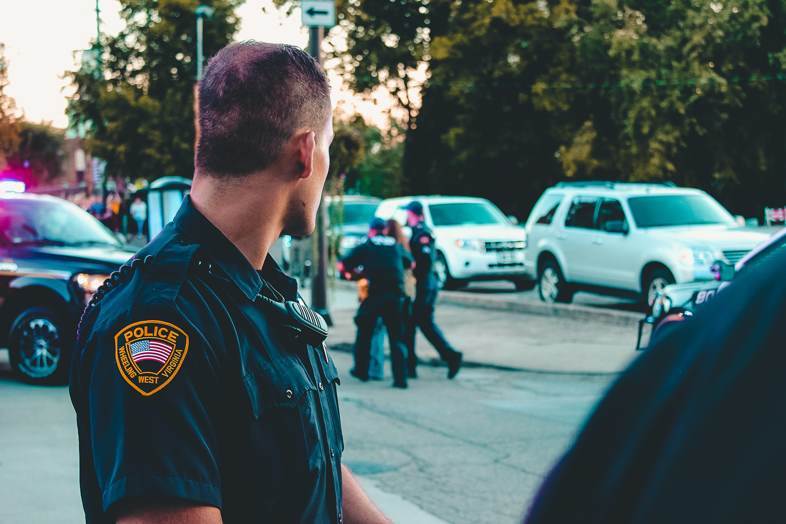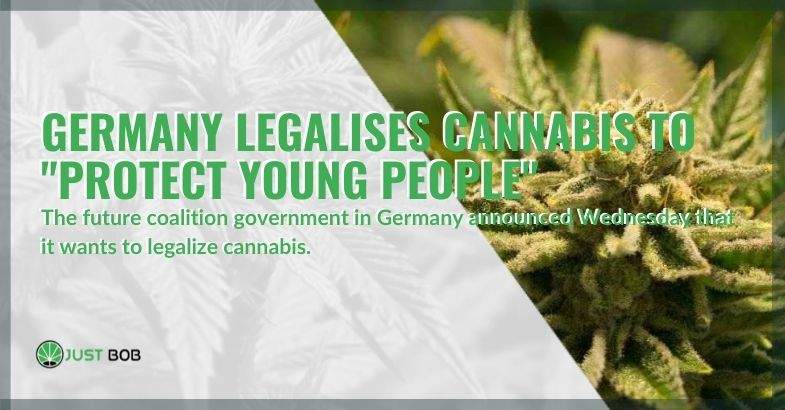Modified on: 31/01/2024
The future coalition government in Germany announced on Wednesday that it wants to legalise cannabis to control the “quality” of the substances and fill the state coffers. A new policy that is opposed to the French government.
It is official: Europe’s most populous country will legalise cannabis. The future coalition government in Germany consisting of the SPD (social democrats), the Greens and the FDP (liberals) announced on Wednesday that they had reached an agreement on this issue. This liberalisation would make the country the second EU country, after the Netherlands, to choose the controlled sales route. France, however, is still far from this.
Germany already has less restrictive laws than many of its European neighbours, with the possibility in some cities such as Berlin to reserve a few grams for personal consumption. In 2017, the use of cannabis for medicinal purposes (like CBD oil) was also approved. However, the legalisation of the herb has been demanded for many years by the Greens and Liberals.
Read also: Bat guano: what it consists of and why it is used for cannabis cultivation
Public health issue
Soon to succeed Angela Merkel, the future team, wants to approve “the controlled distribution of cannabis to adults for consumption in licensed shops”. This mini-revolution “will make it possible to control quality, prevent trafficking and protect young people”, claims the coalition around social democrat Olaf Scholz.


Indeed, cannabis sold on the street is often cut with other substances such as hairspray, sand, or even chemicals such as synthetic glue designed to inflate the weight of the weed artificially. In 2018, Berlin Cannabis Magazin had the capital’s most renowned shops analysed and had the worrying result that eight out of nine products were cut with other substances.
Health authorities are also alarmed by the spread of new synthetic cannabinoids with a very high THC content, which poses a health risk, especially for younger people. For example, the German University of Ulm observed almost eight times more cases of cannabis-related psychosis in 2019 than in 2011 and found that the THC content of cannabis consumed in Germany had increased significantly over the same period.
A very lucrative market
Therefore, legalisation would allow the composition of the consumed product to be precisely controlled. Over-the-counter cannabis could also be a fortune for state coffers and turn into ‘green gold’, as in Canada or US states that allow recreational use of hemp.
A current study by a research team at the Heinrich Heine University Düsseldorf estimates the public revenue from the legalisation of cannabis at about 4.7 billion euros. A tax on cannabis equal to tobacco or alcohol alone would yield 1.8 billion per year.
According to this study, which estimates about 27 thousand more jobs would follow with legalisation, prosecution of consumers and small traders could also save nearly one billion euros. The prohibition of cannabis and hashish costs taxpayers money every year, “without having any positive effects, ” says Georg Wurth, the German Cannabis Association general manager.
Future outlets have not yet been defined. However, the association of pharmacists supports the distribution of tobacco products, “coffee shops”, and pharmacies.
Read also: Growing marijuana outdoors: typical characteristics of outdoor varieties include the following
Police officers and addiction experts are concerned!
Legalisation still has many opponents in Germany. The CDU’s anti-drugs spokesman accuses the coalition of carrying out an “experiment on the health of our society and our young people”. “Should the state make money by throwing its citizens into the danger of addiction, permanent psychosis and physical and mental suffering? I think it is immoral.


Police fear a “minimisation of cannabis use“, and addiction experts warn of possible effects on mental health and cancer risk young people. The future coalition promised to review the future law after four years.
First state measure: legalising cannabis in Germany
Olaf Scholz will succeed Angela Merkel at the head of a political coalition consisting of the Greens, SPD and FDP Liberals.
A surprising introduction. This Wednesday, 24 November, Germany adopted a government almost two months after parliamentary elections. In power is a “traffic light” coalition with the Greens (green), the Liberals (yellow) and the Social Democrats (red) under the leadership of Olaf Scholz. Your first announcement? The legalisation of cannabis.
After the parliamentary elections, marked by a historic loss for Angela Merkel’s conservative party, Social Democrat Olaf Scholz becomes the next chancellor of Europe’s top economy with an unprecedented alliance with the Greens and the liberal FDP.
Three essential tasks are assigned to these two parties. For the Greens, foreign affairs and the climate and economy ministry, the FDP is responsible for finances. The names of the incumbents are not yet known, but some are predictable: Annalena Baerbock for the Greens, who had run for the Chancellery, for diplomacy; Christian Lindner, head of the FDP, for the stock exchange and co-chairman for the environment; and Robert Habeck, graduate philosopher and successful writer, for the environment.
The three parties signed a coalition ‘treaty’ entitled ‘Dare to make further progress. Alliance for Freedom, Justice and Sustainability gives environmental protection a high priority, particularly with a planned phase-out of coal by 2030 compared to 2038 previously. After this, another measure was announced: their desire to legalise cannabis.
Another step after medical cannabis
Germany had given cannabis the green light for medical use in 2017. Legalisation is, therefore, one more step.
“We are introducing the controlled distribution of cannabis to adults for consumption in authorised shops,” announced the government agreement presented by the three coalition parties.
This mini-revolution in the country “will make it possible to control quality, prevent the transmission of contaminated substances and ensure the protection of young people”, the document says, adding that “the social impact of the law” would be assessed after four years.
The new coalition of Social Democrats, Greens, and Liberals also want to develop “drug control” operations, which would verify that the drug is not processed with other substances.
CBD cannabis in Germany
Another flagship measure that the unprecedented new team in power in Germany intends to implement is a return to budgetary discipline, starting in 2024.
Meanwhile, you can already find and legally buy the best CBD online at Justbob! It is the best way to fully enjoy the benefits of cannabis for your body and mind!









